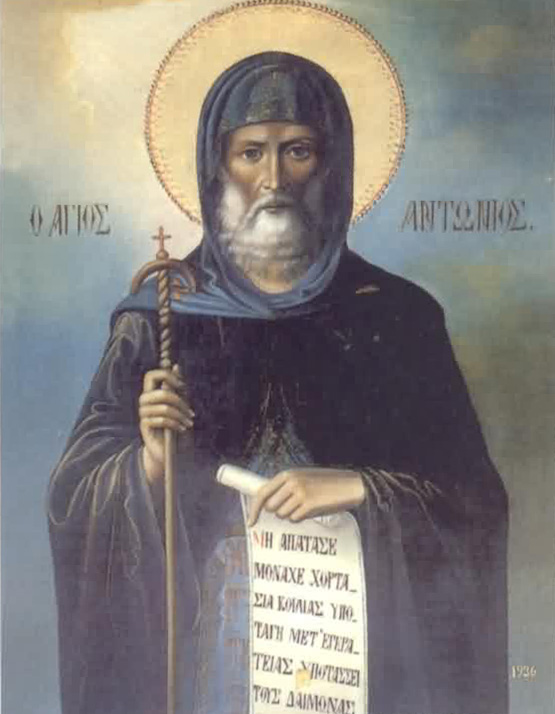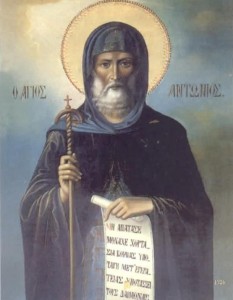
 Saint Anthony or Antony (Greek: Ἀντώνιος, Antṓnios; Latin: Antonius; c. 251–356) was a Christian monk from Egypt, revered since his death as a saint. He is distinguished from other saints named Anthony by various epithets: Anthony the Great,Anthony of Egypt, Anthony the Abbot, Anthony of the Desert, Anthony the Anchorite, and Anthony of Thebes. For his importance among the Desert Fathers and to all later monasticism, he is also known as the Father of All Monks. His feast day is celebrated on January 17 among the Orthodox and Catholic churches and on Tobi 22 in the Egyptian calendar used by the Coptic Church. He is also considered the “Father of Monasticism”
Saint Anthony or Antony (Greek: Ἀντώνιος, Antṓnios; Latin: Antonius; c. 251–356) was a Christian monk from Egypt, revered since his death as a saint. He is distinguished from other saints named Anthony by various epithets: Anthony the Great,Anthony of Egypt, Anthony the Abbot, Anthony of the Desert, Anthony the Anchorite, and Anthony of Thebes. For his importance among the Desert Fathers and to all later monasticism, he is also known as the Father of All Monks. His feast day is celebrated on January 17 among the Orthodox and Catholic churches and on Tobi 22 in the Egyptian calendar used by the Coptic Church. He is also considered the “Father of Monasticism”
All of the Saint Anthony’s images have been completely whitewashed to have more Eurocentric features. So, the images seen on the internet do not show his true features.
The biography of Anthony’s life by Athanasius of Alexandria helped to spread the concept of monasticism, particularly in Western Europe via its Latin translations. He is often erroneously considered the first monk, but as his biography and other sources make clear, there were many ascetics before him. Anthony was, however, the first known ascetic going into the wilderness (about ad 270), a geographical move that seems to have contributed to his renown. Accounts of Anthony enduring supernatural temptation during his sojourn in the Eastern Desert of Egypt inspired the often-repeated subject of the temptation of St. Anthony in Western art and literature.
Anthony is appealed to against infectious diseases, particularly skin diseases. In the past, many such afflictions, including ergotism,erysipelas, and shingles, were historically referred to as St. Anthony’s fire.
Anthony was born in Coma in Lower Egypt in ad 251 to wealthy landowner parents. When he was about 18 years old, his parents died and left him with the care of his unmarried sister. Shortly thereafter, he decided to follow the Evangelical counsel of Jesus which reads, “If you want to be perfect, go, sell what you have and give to the poor, and you will have treasures in heaven.”[Mt 19:21] Anthony gave away some of his family’s lands to his neighbors, sold the remaining property, and donated the funds thus raised to the poor. He then left to live an ascetic life, placing his sister with a group of Christian virgins, a sort of proto-nunnery.
For the next fifteen years, Anthony remained in the area, spending the first years as the disciple of another local hermit. There are various legends associating Anthony with pigs: one is that he worked as a swineherd during this period.
According to Athanasius, the devil fought Anthony by afflicting him with boredom, laziness, and the phantoms of women, which he overcame by the power of prayer, providing a theme for Christian art. After that, he moved to a tomb, where he resided and closed the door on himself, depending on some local villagers who brought him food. When the devil perceived his ascetic life and his intense worship, he was envious and beat him mercilessly, leaving him unconscious. When his friends from the local village came to visit him and found him in this condition, they carried him to a church.
After he recovered, he made a second effort and went back into the desert to a farther mountain by the Nile called Pispir (now Der-el-Memun), opposite Arsinoe. There he lived strictly enclosed in an old abandoned Roman fort for some 20 years. According to Athanasius, the devil again resumed his war against Anthony, only this time the phantoms were in the form of wild beasts, wolves, lions, snakes, and scorpions. They appeared as if they were about to attack him or cut him into pieces. But the saint would laugh at them scornfully and say, “If any of you have any authority over me, only one would have been sufficient to fight me.” At his saying this, they disappeared as though in smoke. While in the fort he only communicated with the outside world by a crevice through which food would be passed and he would say a few words. Anthony would prepare a quantity of bread that would sustain him for six months. He did not allow anyone to enter his cell; whoever came to him stood outside and listened to his advice.
